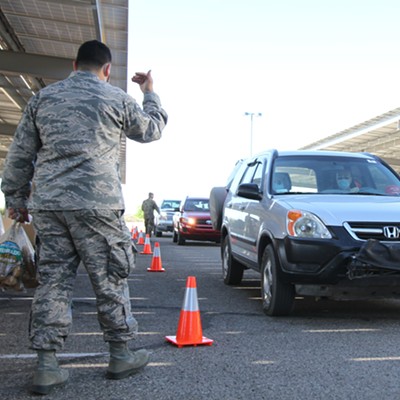And each time Warden Charles Flanagan steps outside for a break, he glimpses this ribbon, wrapped around a gray concrete pillar just beyond the lobby.
For a man overseeing 4,200 inmates and too few guards, these are complex moments: The ribbon is a keen reminder of a war being waged thousands of miles away, and of 10 prison staffers now on duty in Iraq. To Flanagan, it also denotes a struggle to fill resulting manpower gaps back home.
"This creates a difficult situation for us," he says. "It really hurts when we're understaffed and overcrowded."
Then there's the emotional toll. Flanagan's employees--guys like Bruce Maynard, Dan Lawrence and Mikell Miller--feel it first-hand. Miller recently served nearly a year in Iraq; Maynard, a corrections education staffer, spent 12 months deployed away from his job and family; and Lawrence lost a family member for good: On April 12, his younger brother, Marine Cpl. Jeffrey David Lawrence, was killed by a roadside bomb near the Iraqi city of Fallujah.
Dan Lawrence is a lanky man with dark, angry eyes. Sitting between Maynard and Miller, he contemplates his own pending deployment in January. "To tell you the truth," he says, "I'm ready to go exact my own pound of flesh."
Employees enduring such distractions does not make Warden Flanagan's job any easier. "There's more than just the impact of staffing," he says. "There's also an emotional impact, and it wears on all of us."
Not since World War II have so many National Guard and Reserve members been called to active duty--creating headaches for co-workers left behind, as they struggle to cover the manpower gaps. Call-ups have taken a toll on budget-pinched government agencies across the country. but deployments hit particularly hard on places like this prison, which already suffers a shortage of corrections officers. Tight budgets make it impossible for Flanagan to hire temporary guards.
Other pockets of public service have been similarly affected. In Washington State, for example, 62 percent of the 87,000 National Guard soldiers--including many top firefighters--are on active duty during the summer fire season. "This has had a huge impact," said an apprehensive Gov. Gary Locke, following a governors' meeting with Pentagon officials in July.
In Arizona, about 2,000 of the 4,400 National Guard members have been activated since 2002, and the majority of them serve more than a year. Currently, about 700 are on active duty, leaving empty jobs behind. Particularly hard-hit are law enforcement agencies, says Patty Urias, a spokeswoman for Gov. Janet Napolitano. "Just by the nature of their work, there are a higher percentage (of deployments) in some agencies, particularly with Department of Corrections and the Department of Public Safety."
At the Arizona Department of Corrections, 91 employees are currently on active duty and about 125 are on standby. The Department of Public safety has 21 officers on active duty--at a time when the agency is already short about 100 positions, including badly needed highway patrol officers. While the staffing shortage is acute, the Tucson highway patrol division "has so far been able to weather the storm," says Commander Brant Benham. "But we could use 10 more officers on our staff as it is."
Paul Etnire feels that manpower pinch first-hand. As Arizona's only DPS recruiting officer, his own recent 16-month deployment to Iraq expanded his supervisor's workload. The department "is already stretched thin, and those who stay behind must pick up the slack," says Etnire.
But even when call-ups don't create staffing problems, employers such as the city of Tucson have other concerns. Out of 5,700 employees, only six are currently deployed. However, the city fills the income gap if military pay falls short of their employees' salaries. That costs the city about $40,000 a year, says Suzanne Machain, deputy director of human resources. Fortunately, the deployments are spread throughout various city departments, so no single area is particularly hard hit. And the city's problem "isn't nearly as significant as in some state agencies, where 20 to 40 people might be out," she says.
As in Washington, maintaining adequate numbers of firefighters is another public safety concern. Guard members act as a reserve fire-fighting force, and their equipment--such as Black Hawk helicopters--was crucial in fighting the huge Rodeo-Chediski fire in 2002.
While deployments haven't had much impact yet, "they could as time goes on," says Ron Melcher, fire coordinator for the Arizona State Land Department. Of greater concern are firefighters from local departments. When those people are deployed in the military, "we lose fire-fighting expertise," he says.
But plenty of manpower for emergencies remains, says Maj. Eileen Bienz, spokeswoman for the Arizona National Guard. "And we work closely with the governor's office" whenever deployments are scheduled, she says. At the same time, many employers suffer the sacrifice willingly because guard and reserve members make excellent employees. "They are dedicated and hard working. Employers recognize that."
Employers like Warden Flanagan also recognize that sacrifices are rife with unintended consequences. "It creates mixed feelings," he says. "We value these employees as heroes, and we believe in public service. But as a warden, there are immediate nuts-and-bolt issues that I have to contend with. We don't operate in a vacuum."
Flanagan pauses. Then he mentions the July funeral for Jeffrey Lawrence. "You know," he says quietly, "a mind-numbing number of my employees showed up, entire families. It was very touching."
One of these days, he adds, that fading yellow ribbon will be exchanged for a new model. As such, it will be the second prison ribbon shredded by the winds of war.










